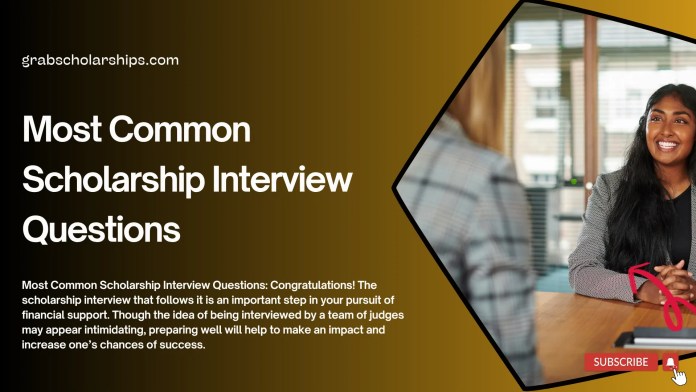Whether you’re applying for an undergraduate, master’s, or doctoral scholarship, this guide outlines the most frequently asked scholarship interview questions and provides practical advice on how to answer them effectively.
Summary of This Post:
- What to expect in a scholarship interview
- The most common scholarship interview questions
- Best strategies to answer scholarship questions
- Examples of strong responses
- Tips to improve your interview performance
- Mistakes to avoid during your scholarship interview
Most Common Scholarship Interview Questions and Sample Approaches
1. Tell us about yourself.
Purpose: To understand who you are beyond the application.
How to Answer: Craft a brief, compelling narrative that reflects your academic journey, personal values, and goals. Avoid generic phrases. Instead, highlight specific experiences or turning points that shaped your path.
2. Why do you deserve this scholarship?
Purpose: To assess alignment with the scholarship’s mission.
How to Answer: Link your academic achievements, extracurricular involvement, leadership roles, financial need, or community contributions to the objectives of the sponsoring organization. Be clear and confident about your merit and motivation.
3. What are your strengths and weaknesses?
Purpose: To evaluate your self-awareness and growth mindset.
How to Answer: Choose relevant strengths backed with real examples. For weaknesses, mention areas you’re actively working to improve, showing responsibility and personal development. Avoid clichés.
4. Where do you see yourself in five years?
Purpose: To understand your vision and career direction.
How to Answer: Share your long-term academic or professional goals and how this scholarship will support your journey. Show ambition, but keep it realistic and focused.
5. Why did you choose this university or program?
Purpose: To gauge how informed your decision is.
How to Answer: Discuss what drew you to the specific institution or course—such as its reputation, faculty, resources, or alignment with your interests. Show that you’ve researched and chosen intentionally.
6. How will you use the scholarship funds?
Purpose: To assess your financial planning and commitment.
How to Answer: Be specific about how the funding will help cover tuition, books, accommodation, and other academic-related expenses. Emphasize how it enables you to focus on your studies and goals.
7. Do you have any questions for us?
Purpose: To test your curiosity and genuine interest.
How to Answer: Ask thoughtful questions about the scholarship program, alumni support, or expectations from recipients. This is your chance to show engagement and long-term thinking.
Additional Tips for a Successful Scholarship Interview
- Research the scholarship provider: Understand the organization’s mission and how your goals align with it.
- Dress professionally: First impressions matter, whether the interview is virtual or in person.
- Practice strong communication: Make eye contact, listen attentively, and answer clearly.
- Show enthusiasm: Demonstrate passion for your field and the impact you hope to make.
- Send a thank-you note: Always express gratitude after the interview.
A scholarship interview is a two-way conversation. While you’re being evaluated, you’re also determining if the scholarship and institution align with your aspirations. Approach the interview with confidence, preparation, and authenticity. Let your personality and purpose shine—this is your opportunity to leave a lasting impression.
For more tips on acing scholarship interviews, securing fully funded scholarships, or writing strong personal statements, visit GrabScholarships.com.




